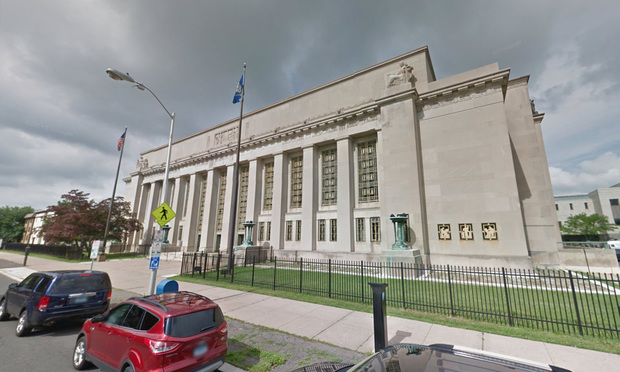Lawsuit Accuses MDC of Collecting Unlawful Water Surcharges
A prospective class action lawsuit has been filed on behalf of residents in four communities who claim they were wrongly billed a surcharge for their water usage.
March 07, 2018 at 12:22 PM
3 minute read

A prospective class action lawsuit has been filed on behalf of three Glastonbury residents who allege the Metropolitan District Commission unlawfully charged them a surcharge totaling more than $1,000 each over a nine-year period.
The lawsuit—filed Tuesday in Hartford Superior Court—comes four days after the Connecticut Supreme Court upheld a lower court ruling finding the charges from 2006-2014 were not lawful.
The lawsuit claims the MDC wrongfully charged water customers in East Granby, Farmington, Glastonbury and South Windsor a nonmember town water surcharge. The MDC supplies water and sewer services to the eight member towns. The four nonmember towns are provided water service, but not sewer service.
Craig Raabe, attorney for plaintiffs William and Laurie Paetzold, and Andrew Pinkowski, said Wednesday that about 9,000 businesses, residents and town facilities could be part of the class.
“Not everyone in those towns are part of the class action, only those who have city water,” said Raabe, a partner with Izard, Kindall & Raabe in West Hartford. While the total suit could be worth several million of dollars, Raabe said he will not know the amount until discovery.
In her May 2016 ruling, Hartford Superior Court Judge Susan Peck said the surcharges were illegal, and anyone who paid them is entitled to damages.
“There is no question that if the surcharges are unlawful, then the plaintiff can demonstrate damages for the years the surcharges were imposed,” Peck wrote.
The annual surcharges for the plaintiffs varied during the nine years in question and went from a low of $41.40 in 2006 to a high of $423 in 2013. The surcharge was $158.10 in 2012 and $198.96 in 2014. It's not clear why there was a spike in 2013.
Neither MDC counsel R. Bartley Halloran or MDC Chief Executive Officer Scott Jellison could be reached for comment Wednesday.
In October 2014, a state law took effect governing the surcharges going forward. That law states that charges to nonmember communities must be consistent with member communities. Member communities during the nine-year period in question did not have a surcharge fee.
The lawsuit cites three counts: breach of contract, breach of good faith and fair dealing, and unjust enrichment.
Assisting Raabe in the case are colleagues Robert Izard and Mark Kindall.
This content has been archived. It is available through our partners, LexisNexis® and Bloomberg Law.
To view this content, please continue to their sites.
Not a Lexis Subscriber?
Subscribe Now
Not a Bloomberg Law Subscriber?
Subscribe Now
NOT FOR REPRINT
© 2025 ALM Global, LLC, All Rights Reserved. Request academic re-use from www.copyright.com. All other uses, submit a request to [email protected]. For more information visit Asset & Logo Licensing.
You Might Like
View All
Justice 'Weaponization Working Group' Will Examine Officials Who Investigated Trump, US AG Bondi Says



Trending Stories
- 1States Accuse Trump of Thwarting Court's Funding Restoration Order
- 2Microsoft Becomes Latest Tech Company to Face Claims of Stealing Marketing Commissions From Influencers
- 3Coral Gables Attorney Busted for Stalking Lawyer
- 4Trump's DOJ Delays Releasing Jan. 6 FBI Agents List Under Consent Order
- 5Securities Report Says That 2024 Settlements Passed a Total of $5.2B
Who Got The Work
J. Brugh Lower of Gibbons has entered an appearance for industrial equipment supplier Devco Corporation in a pending trademark infringement lawsuit. The suit, accusing the defendant of selling knock-off Graco products, was filed Dec. 18 in New Jersey District Court by Rivkin Radler on behalf of Graco Inc. and Graco Minnesota. The case, assigned to U.S. District Judge Zahid N. Quraishi, is 3:24-cv-11294, Graco Inc. et al v. Devco Corporation.
Who Got The Work
Rebecca Maller-Stein and Kent A. Yalowitz of Arnold & Porter Kaye Scholer have entered their appearances for Hanaco Venture Capital and its executives, Lior Prosor and David Frankel, in a pending securities lawsuit. The action, filed on Dec. 24 in New York Southern District Court by Zell, Aron & Co. on behalf of Goldeneye Advisors, accuses the defendants of negligently and fraudulently managing the plaintiff's $1 million investment. The case, assigned to U.S. District Judge Vernon S. Broderick, is 1:24-cv-09918, Goldeneye Advisors, LLC v. Hanaco Venture Capital, Ltd. et al.
Who Got The Work
Attorneys from A&O Shearman has stepped in as defense counsel for Toronto-Dominion Bank and other defendants in a pending securities class action. The suit, filed Dec. 11 in New York Southern District Court by Bleichmar Fonti & Auld, accuses the defendants of concealing the bank's 'pervasive' deficiencies in regards to its compliance with the Bank Secrecy Act and the quality of its anti-money laundering controls. The case, assigned to U.S. District Judge Arun Subramanian, is 1:24-cv-09445, Gonzalez v. The Toronto-Dominion Bank et al.
Who Got The Work
Crown Castle International, a Pennsylvania company providing shared communications infrastructure, has turned to Luke D. Wolf of Gordon Rees Scully Mansukhani to fend off a pending breach-of-contract lawsuit. The court action, filed Nov. 25 in Michigan Eastern District Court by Hooper Hathaway PC on behalf of The Town Residences LLC, accuses Crown Castle of failing to transfer approximately $30,000 in utility payments from T-Mobile in breach of a roof-top lease and assignment agreement. The case, assigned to U.S. District Judge Susan K. Declercq, is 2:24-cv-13131, The Town Residences LLC v. T-Mobile US, Inc. et al.
Who Got The Work
Wilfred P. Coronato and Daniel M. Schwartz of McCarter & English have stepped in as defense counsel to Electrolux Home Products Inc. in a pending product liability lawsuit. The court action, filed Nov. 26 in New York Eastern District Court by Poulos Lopiccolo PC and Nagel Rice LLP on behalf of David Stern, alleges that the defendant's refrigerators’ drawers and shelving repeatedly break and fall apart within months after purchase. The case, assigned to U.S. District Judge Joan M. Azrack, is 2:24-cv-08204, Stern v. Electrolux Home Products, Inc.
Featured Firms
Law Offices of Gary Martin Hays & Associates, P.C.
(470) 294-1674
Law Offices of Mark E. Salomone
(857) 444-6468
Smith & Hassler
(713) 739-1250










